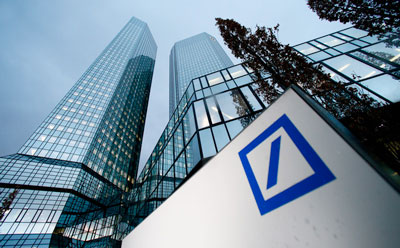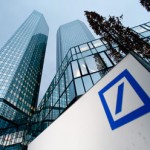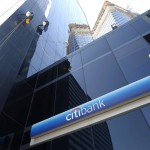Deutsche Bank Shares Drop on Fears of Capital Raising

Intensifying concerns about Deutsche Bank AG’s financial health caused its shares to drop Monday and pushed the company into the awkward position of publicly denying that it had sought help from the German government.
Shares of Deutsche Bank, one of the world’s largest banks and a linchpin of Europe’s financial system, tumbled 7.5% in European trading, closing at €10.55 ($11.85), their lowest price in decades. They have slid 53% this year, whittling Deutsche Bank’s market value to about $16 billion, roughly the size of regional U.S. lenders like Fifth Third Bancorp and M&T Bank Corp.
The concerns—voiced by a number of analysts and investors—center on whether Deutsche Bank would need to raise capital to fortify its precarious finances. The latest source of pressure is the possibility of a multibillion-dollar legal settlement with the U.S. Justice Department.
The mounting worries threaten to put the German government, which has railed against taxpayer-financed banking rescues in other European countries, in a tricky position.
A Deutsche Bank spokesman said Monday that the lender is “fundamentally strong” and that questions about its capital adequacy are “pure speculation.”
Deutsche Bank’s first option in raising capital to provide a buffer against future losses likely would be to sell new shares to investors. Such a move would hammer the bank’s long-suffering shareholders.
Deutsche Bank spokesman Jörg Eigendorf on Monday denied a German media report that Chief Executive John Cryan had sought help from the German government to resolve a U.S. mortgage-securities investigation. The Wall Street Journal reported earlier this month that the Justice Department proposed that Deutsche Bank pay $14 billion to settle the probes. The bank said it has no intention of paying “anywhere near” the $14 billion amount and that negotiations were just beginning.
Analysts say a fine of even half that size could force Deutsche Bank to replenish its depleted capital cushions. The bank has repeatedly said it has no immediate plans to raise capital.
Further complicating matters, the German government, led by Chancellor Angela Merkel,has been a leading critic of taxpayer bailouts of European banks. Germany has demanded that southern European countries impose steep losses on the bondholders of struggling banks as a precondition of them receiving taxpayer-financed bailouts.
The hard-line stance has stirred resentment in many European countries and would make it politically difficult for Germany to come to the aid of one of its own banks without attaching similarly draconian conditions.
A German magazine over the weekend reported that Ms. Merkel had ruled out providing government assistance to Deutsche Bank before Germany holds national elections next September. The report, citing unnamed government officials, led a spokesman for Ms. Merkel to tell reporters on Monday that there was “no need for such speculation” about state aid for Deutsche Bank.
The report in Focus magazine nonetheless was seen as contributing to Monday’s selloff in shares of Deutsche Bank, which analysts and investors have long assumed Germany would treat as too big to fail if it encountered serious trouble.
Indeed, Deutsche Bank is central to Germany’s economy, which is Europe’s largest. It is one of the country’s largest employers and lenders, and its CEO historically has been viewed as wielding power on par with the country’s finance minister.
Unlike many of its rivals, including Germany’s No. 2 lender, Commerzbank AG, Deutsche Bank avoided a bailout during the financial crisis. That has been a point of pride for a succession of Deutsche Bank CEOs.
But concerns about whether the bank has enough capital to withstand the combination of a large Justice Department settlement, weak business conditions and Mr. Cryan’s plans to restructure the company have been gaining currency—and taking a toll on the bank’s securities.
It isn’t only the bank’s shares that are under pressure. Its riskiest debt securities also have slumped. Deutsche Bank’s $2 billion worth of certain additional Tier 1 debt fell about two European cents on Monday, to around 73 cents on the euro, according to Tradeweb data. The instruments are trading near levels they hit in February, when Deutsche Bank faced a wave of capital concerns and offered to buy back billions of dollars of its senior debt as a show of confidence.
These instruments, known as AT1s, have helped Deutsche Bank boost its capital levels, but they would be the first to absorb losses if the bank collapsed. Interest payments on the AT1s are optional, and Deutsche Bank has repeatedly assured investors this year that it expects to have sufficient funds to pay interest on schedule in early 2017.
The news that the Justice Department is seeking a $14 billion settlement from Deutsche Bank rekindled concerns about the solidity of that AT1 funding, analysts and investors say.
For months the lender has been trying to shrink and cut costs to boost its capital to meet tougher regulatory hurdles ahead. It has been seeking to sell businesses as part of a strategy announced by Mr. Cryan in October 2015. But those goals also have been challenged by tougher market conditions and other complications.
One deal that the bank has announced, in late December 2015, involves the sale of its roughly 20% stake in Hua Xia Bank, a listed company in China. Deutsche Bank initially said it expected the roughly $4 billion deal, involving the sale of the stake to a Chinese insurer, to close by the end of the second quarter but in July extended that timeline to the end of the year, saying a three-month review by Chinese regulators would wrap up on Sept. 24.
That date passed with no announcement. Deutsche Bank has told investors in recent days it still expects the stake sale to close by the end of the year. Any questions about the deal wouldn’t normally by themselves stoke concerns, investors say. But the sale is just one step among many Deutsche has outlined to meet its capital goals.
A spokesman referred to statements by Marcus Schenck, Deutsche Bank’s finance chief, in July that despite the delay, the bank is “still highly confident” in closing the Hua Xia sale by year-end.
Source: WSJ





























